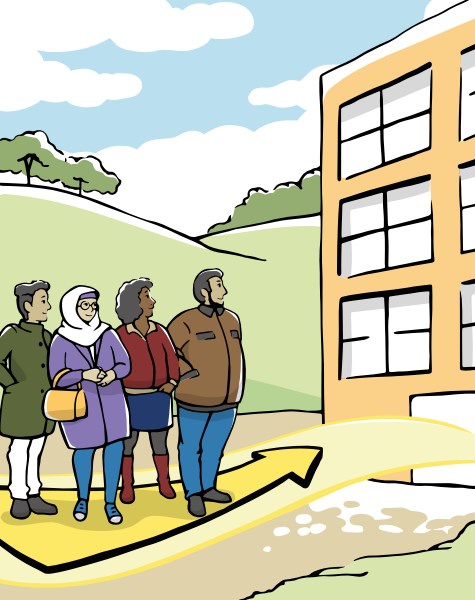
Download IQ Good Practice as PDF
including hands-on report and interview with Elisa Hartmann, project manager of EiKu – culturally sensitive initial training
Initial training as a culturally sensitive learning process
The Tailor-Made Initial Training concept supports the integration of new employees into the company
Starting position/challenge
In order to quickly and sustainably integrate new skilled workers into a company, it is necessary to properly train them, regardless of age, gender or cultural background. Therefore, this approach of culturally sensitive initial training shows how a “good initial training” can succeed by using the resources brought along by the individual and taking into account the specific requirements of the place. During the development of the initial training concept, criteria for successful culturally sensitive initial training were developed, the results were generalised and made applicable to other companies. Ways are pointed out, how to apply already existing knowledge and skills and how to prepare work requirements systematically.
Implementation of the Tailor-Made Initial Training
In the context of the project “EiKu - culturally sensitive initial training in geriatric care” in the IQ Network Bavaria - MigraNet, the sponsor GAB Munich, in cooperation with MÜNCHENSTIFT GmbH, developed and tested an innovative initial training concept. For the transfer to other companies, two resources were developed: the 24-page publication “Toolboxes: Tailor-Made Initial Training” and the accompanying 28-page comic “getting to know each other and learning effectively during initial training”, which illustrates numerous learning paths and conversation situations.
When designing the training concept, the focus was on the question of what the new colleague must know and be able to do in order to do his/her job well. For this purpose, employees were actively involved as experts in the development process of a culturally sensitive concept. Orientation, suitable support by mentors and suitable information are very helpful in culturally sensitive initial training. In the toolbox, the concrete procedure for initial training is outlined using the example of a care facility. The focus is on actual work tasks, such as “ordering care supplies”, which have been prepared as learning exercises. The new employees are supported with goal-oriented questions to find out as much as possible by themselves before they discuss any open points in a conversation with their mentor. Checklists, information sheets and reflection sheets are also provided as examples.
Conclusion
It is worth investing in tailor-made, culturally sensitive initial training, as the advantages benefit everyone. An evaluation by MÜNCHENSTIFT GmbH has shown that the initial training concept has the following effects: the initial training can take place quicker and more effectively, while at the same time ensuring high-quality standards and building upon existing knowledge and skills. Finally, it is possible to better integrate the new employees, which leads to a lower rate of staff turnover.
Addressees for transfer:
HR managers who are looking for good initial training for their new employees
Concept Tailor-Made Initial Training:
The Tailor-Made Initial Training concept and the accompanying comic, which visualises numerous learning paths and conversation scenarios, focus on culturally sensitive and systematic training of new employees. Concrete examples are used to provide guidance, recommendations for action and potential applications for companies. The approach promises advantages in the familiarisation process for new employees and companies through a structure that provides orientation and has both an appreciative and motivating effect. New employees can take on responsibility earlier while at the same time ensuring the work quality.
Project:
EiKu - culturally sensitive initial training
Implementing organisation:
GAB Munich
Project contact:
Elisa Hartmann, Lindwurmstr. 41-43, 80337 München, Tel.: 089/2441791 26, elisa.hartmann(at)gab-muenchen.de
